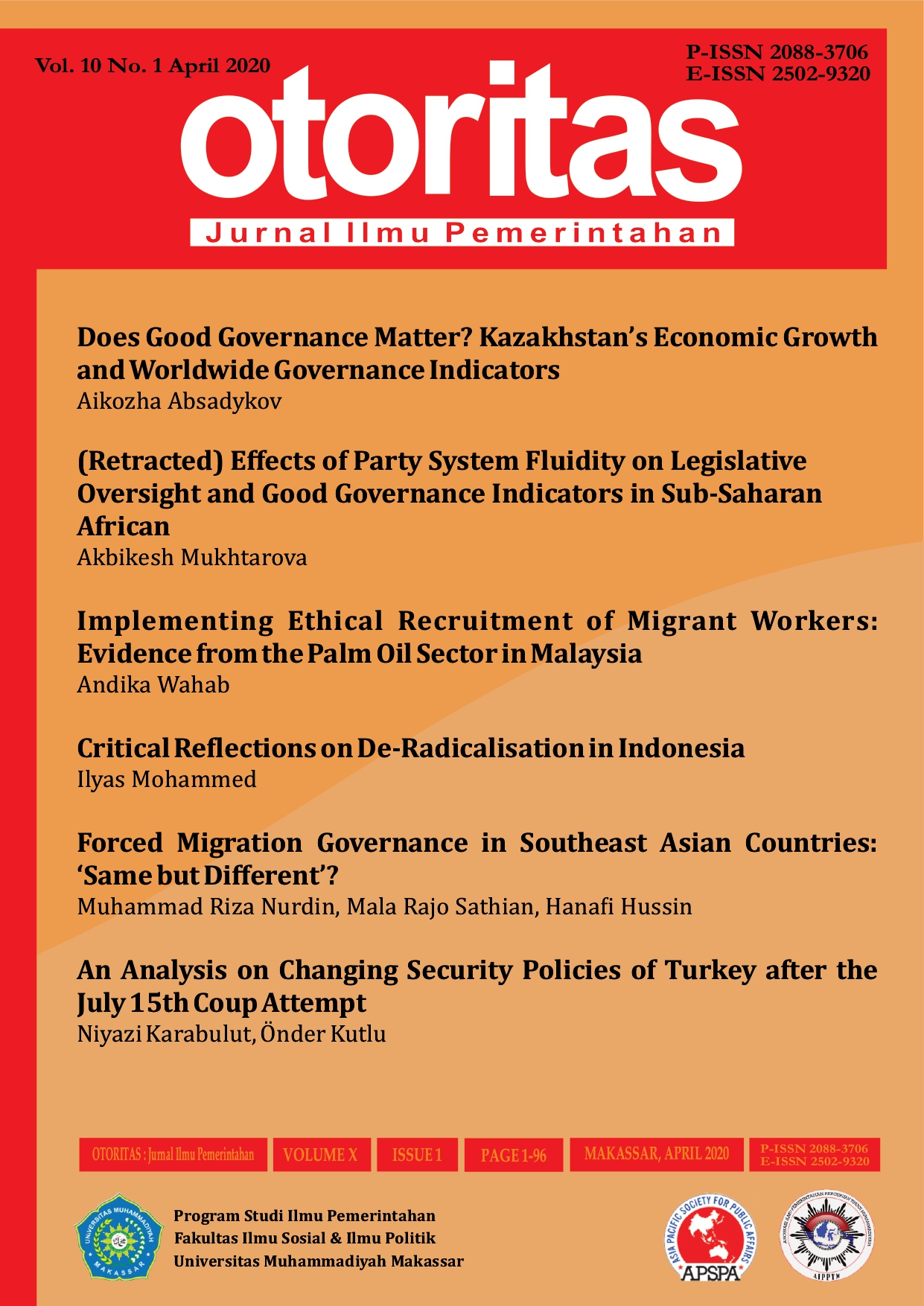Does Good Governance Matter? Kazakhstan’s Economic Growth and Worldwide Governance Indicators
DOI:
https://doi.org/10.26618/ojip.v10i1.2776Keywords:
Good Governance, Worldwide Governance Indicators, Corruption, Economic GrowthAbstract
Good governance is generally believed to improve country’s economic performance. This paper studies the relationship between the World Bank’s Worldwide Governance Indicators (Voice and Accountability, Political Stability and Absence of Violence, Government Effectiveness, Regulatory Quality, Rule of Law, Control of Corruption) and economic growth in terms of GDP per capita in Kazakhstan. The findings of the research indicate that there is a significant positive relationship between good governance and economic performance of Kazakhstan. Specifically, results show that the Control of Corruption has the strongest impact on GDP per capita.
References
Acemoglu, D., Verdier, T., & Robinson, J. A. (2005). Kleptocracy and Divide and Rule: A Model of Personal Rule. Journal of the European Economic Association, 2(23), 162-192.
Aisen, A., & Veiga, F. J. (2013). How does political instability affect economic growth? European Journal of Political Economy, 29, 151-167.
Alesina, A., Özler, S., Roubini, N., & Swagel, P. (1996). Political instability and economic growth. Journal of Economic Growth, 1(2), 189-211.
Campos, N. F., & Karanasos, M. G. (2008). Growth, volatility and political instability: Non-linear time-series evidence for Argentina, 1896-2000. Economics Letters, 100(1), 135-137.
Chong, A., & Calderon, C. (2000). Causality and feedback between institutional measures and economic growth. Economics & Politics, 12(1), 69-81.
Emara, N.E., & Jhonsa, E.J. (2014). Governance and Economic Growth: Interpretations for MENA Countries. Topics in Middle Eastern and African Economies, 16(2), 164-183.
Feng, Y. (1997). Democracy, political stability and economic growth. British Journal of Political Science, 27(3), 391-418.
Fukuyama, F. (2013). What is governance?. Governance, 26(3), 347–368. https://doi.org/10.1111/gove.12035.
Grindle, M. S. (2004). Good enough governance: Poverty reduction and reform in developing countries. Governance, 17(4), 525–548.
Grindle, M. S. (2007). Good enough governance revisited. Development Policy Review, 25(5), 553–574.
Hall, R. E., & Jones, C. I. (1999). Why do some countries produce so much more output per worker than others? (No. w6564). National Bureau of Economic Research.
Han, X., Khan, H. A., & Zhuang, J. (2014). Do Governance Indicators Explain Development Performance? A Cross-Country Analysis. (November 2014). Asian Development Bank Economics Working Paper Series, (417).
Huynh, K. P., & Jacho-Chávez, D. T. (2009). Growth and governance: A nonparametric analysis. Journal of Comparative Economics, 37(1), 121-143.
Kaufmann, D., & Kraay, A. (2002). Growth without governance. World Bank Policy Research Working Paper, (2928).
Kaufmann, D., Kraay, A., & Mastruzzi, M. (2010). The Worldwide Governance Indicators: Methodology and Analytical Issues. Hague Journal on the Rule of Law, 3(2), 220–246.
Kaufmann, D., Kraay, A., & Zoido-Lobatan, P. (1999). Policy Research Working Paper 2196. Governance Matters, (October 1999), 60.
Khan, M., & Zubair, S. (2014). Good Governance : Pakistan’s Economic Growth. Pakistan Journal of Commerce and Social Sciences, 8(1), 258–271.
Knox, C., & Janenova, S. (2018). Governance in Kazakhstan: improvements but could do better. The Astana Times. Retrieved from https://astanatimes.com/2018/09/governance-in-kazakhstan-improvements-but-could-do-better/.
Lahouij, H. (2016). Does Governance Matter to Economic Growth? Evidence from MENA Countries. Retrieved from http://thekeep.eiu.edu/lib_awards_2016_docs%0Ahttp://thekeep.eiu.edu/lib_awards_2016_docs/5.
Morita, S., & Zaelke, D. (2005). Rule of law, Good Governance, and Sustainable Development. Seventh International Conference on Environmental Compliance and Enforcement (pp. 9-15).
Pelizzo, R., & Stapenhurst, F. (2013). The Dividends of Good Governance. Poverty & Public Policy, 5(4), 370–384.
Rodrik, D. (2007). One Economics, Many Recipes: Globalization, Institutions, and Economic Growth. One Economics, Many Recipes: Globalization, Institutions, and Economic Growth.
The World Bank Data. (2019). Kazakhstan. Retrieved from https://data.worldbank.org/country/kazakhstan.
The World Bank. (2019). Worldwide Governance Indicators. Retrieved from https://info.worldbank.org/governance/wgi/.
United Nations Development Program. (1997). Governance for Sustainable Development. Retrieved from http://mirror.undp.org/magnet/policy/chapter1.htm
World Bank. (1992). Governance and development (English). The World Bank. Retrieved from http://documents.worldbank.org/curated/en/604951468739447676/Governance-and-development.
Downloads
Published
Issue
Section
License
In the event that the article is received by the Editorial Team of Otoritas: Jurnal Ilmu Pemerintahan, with registered number ISSN 2088-3706 (Print), ISSN 2502-9320 (Online) and there is a decision to publish the article, the copyright of the article will be transferred to Otoritas : Jurnal Ilmu Pemerintahan, with registered number ISSN 2088-3706 (Print), ISSN 2502-9320 (Online).
Department of Government Studies, Faculty of Social and Political Sciences, Universitas Muhammadiyah Makassar in collaboration with Muhammadiyah’s College Association of Government Studies (AIPPTM) and Asia Pacific Society for Public Affairs (APSPA) as the publisher of Otoritas: Jurnal Ilmu Pemerintahan, with registered number ISSN 2088-3706 (Print), ISSN 2502-9320 (Online) holds the copyright of all articles published in this journal.
Department of Government Studies, Faculty of Social and Political Sciences, Universitas Muhammadiyah Makassar in collaboration with Muhammadiyah’s College Association of Government Studies (AIPPTM) and Asia Pacific Society for Public Affairs (APSPA) holds the right to reproduce and distribute the article and author is not allowed to publish the same article published in this journal.
Statement of Authenticity and Manuscript Copyright can be downloaded: here
After filling in the statement letter, please send via e-mail: otoritas@unismuh.ac.id

